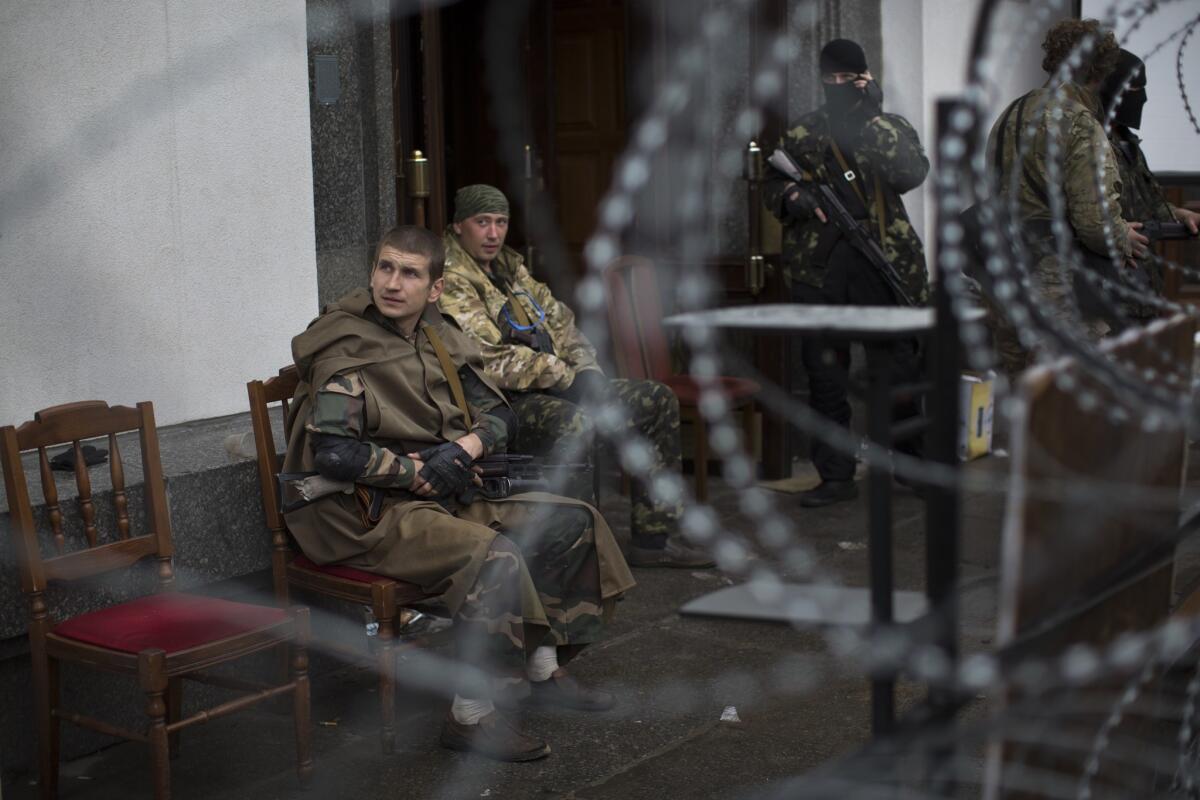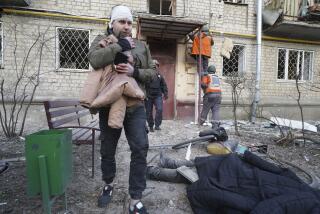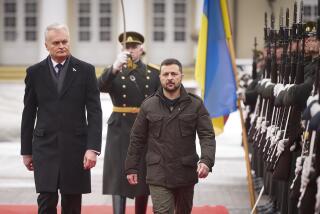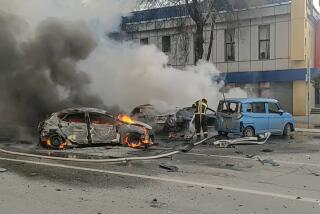Ukraine leader concedes loss of control in occupied eastern regions

Acting Ukrainian President Oleksandr Turchynov conceded Wednesday that police have lost control of the eastern towns and cities occupied by pro-Russia gunmen and ordered a full military alert to prevent the separatist disruptions from spreading.
At a meeting of regional government leaders, Turchynov blamed the erosion of government authority in the Donetsk and Luhansk regions on a Kremlin plot to destabilize Ukraine and seize more of its territory, as it did in annexing Crimea last month.
“The first task that we are facing is to prevent the spreading of the terrorist threat to other regions of Ukraine,” Turchynov was quoted by Interfax-Ukraine as saying at the meeting in Kiev, the Ukrainian capital.
Turchynov accused Moscow of having already sent “instructions” to its proxy forces in eastern Ukraine to take control of the Kharkiv, Dnipropetrovsk, Kherson, Zaporizhia, Mykolaiv and Odessa regions, which would provide a Russian-controlled corridor to Crimea, Black Sea ports and Moldova’s Russian-speaking Transdnistria enclave.
In a further sign of mounting tensions between Russia and its former Soviet neighbors, the Russian military ordered a new airborne unit to begin helicopter training missions along the western borders with the now-independent Baltic states of Estonia, Latvia and Lithuania. The maneuvers were called in response to an “unprecedented” increase in NATO military activity near Russia amid the Ukrainian crisis, the RIA Novosti news agency said, attributing the comments to Russian Defense Minister Sergei Shoigu.
The North Atlantic Treaty Organization last week ordered stepped-up air patrols of its member states bordering Russia, to reassure allies once under Moscow’s domination that the alliance will defend them in the event of Russian aggression.
The situation in the eastern Ukraine region, where armed and masked militants control at least a dozen locales in a 200-mile arc along the Russian border, demonstrates “inaction, helplessness and sometimes treason” on the part of government forces sent in to try to recover the occupied venues, Turchynov said in the televised remarks, Russia Today reported.
The alleged incidents of treason the interim president referred to included the surrender last week of six armored personnel carriers during a failed operation to drive out the separatists from Slovyansk and other towns in the Donetsk region. There were also reports during the Kiev government’s “anti-terrorist operation” waged before and after the Easter holiday of as many as 300 Ukrainian troops defecting to the side of the pro-Russia gunmen.
Turchynov gave his grim account of the government’s slipping hold on a unified country just hours after more armed men arrived at daybreak and took over the regional government headquarters in Luhansk, one of Ukraine’s largest cities where they previously occupied only the local security service building. Allied gunmen also seized government facilities in Horlivka, a city of about 300,000 in Donetsk region, Reuters news agency reported. At the same time, about 30 separatists took over the city council building in Alchevsk, about 50 miles east of Horlivka, Interfax-Ukraine said.
Ukrainian government officials have accused Russian President Vladimir Putin of inciting and supporting the eastern unrest as a means to disrupt or discredit a May 25 presidential election to restore legitimate leadership in Kiev following the ouster of former President Viktor Yanukovich in February. Yanukovich, who took refuge in Russia to escape a tumultuous three-month rebellion, was closely aligned with the Kremlin and drew most of his support from the eastern regions by promising the large Russian-speaking minority there continued economic integration with Russia.
Separatists in the Donetsk region have called for a May 11 referendum to vote on whether to seek an amendment of the Ukrainian constitution to redistribute power from the capital to the regions, or to throw off rule from Kiev altogether. Such regional votes on national matters lack legal force, but that has done little to change the reality of full Russian control of the Crimean peninsula after a similar referendum on March 16.
Unlike in Crimea, however, Russians are a minority in eastern and southern Ukraine, even if a sizable one. And local opinion research suggests the majority of residents in the occupied areas still support Ukrainian unity and oppose Russian intervention.
The escalating aggression in the east worries international security monitors but hasn’t yet put the May 25 national vote in peril, the head of the Ukraine mission of the Organization for Security and Cooperation in Europe noted Wednesday.
“What’s positive is that no political parties have so far called for a boycott of the election,” said Tim Guldimann in Kiev. “Governors and mayors in the east have also indicated that elections will be carried out.”
OSCE representatives were also at work Wednesday trying to negotiate the release of seven military observers taken hostage by the gunmen in Slovyansk last week while on a mission to investigate reports of unusual military activity in the area. Their mission was conducted under provisions of a European security agreement endorsed by all 57 member nations, including Ukraine and Russia.
More to Read
Start your day right
Sign up for Essential California for news, features and recommendations from the L.A. Times and beyond in your inbox six days a week.
You may occasionally receive promotional content from the Los Angeles Times.







